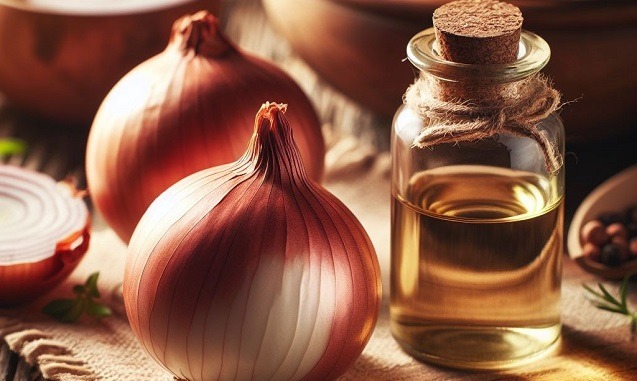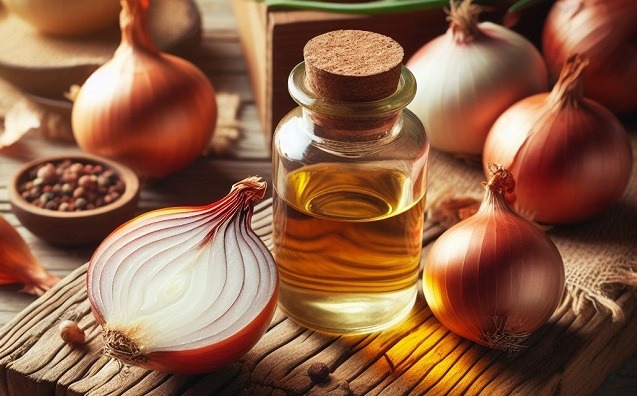This humble kitchen staple has been used in various cultures as a natural remedy for centuries. In this blog, we’re going to dive deep into onion in the ear for ear infection. We’ll explore the effectiveness, methods, and safety of this unconventional remedy. So, grab your onion, and let’s peel back the layers!
What Causes Ear Infections?
Ear infections are a common health issue, especially among children, and can be incredibly uncomfortable. Understanding what causes these infections is crucial before we start talking about remedies like onions.
Bacterial and Viral Infections
Most ear infections are triggered by either bacterial or viral infections. When bacteria or viruses invade the ear, they can cause inflammation and buildup of fluid in the middle ear, leading to pain, discomfort, and sometimes even hearing loss.
It’s important to note that while home remedies can provide temporary relief, they do not cure the infection itself, which might require medical intervention, especially if it’s bacterial.
Environmental Factors: Allergies and More
Besides germs, environmental factors like allergies, colds, and sinus infections can also lead to ear infections by causing congestion and swelling of the nasal passages, throat, and eustachian tubes.
This swelling can block the drainage of fluid from the ear, creating a breeding ground for infections.
Why Onions?
The use of onion in the ear for ear infection in treating earaches stems from their anti-inflammatory properties, which can help reduce pain and swelling. The warmth provided by the poultice also plays a role in soothing discomfort. While not a substitute for medical treatment in serious cases, these onion-based remedies can be a handy first aid for minor ear pain at home.
The Historical Use of Onions in Medicine
Historically, onions have been used by various cultures to treat ailments ranging from colds and fevers to heart disease and headaches. Their use in treating infections is particularly notable, with records dating back centuries in both Eastern and Western medicine.
Onions in Folk Medicine
In folk medicine, onions were often considered a first-aid treatment for infections due to their supposed antibacterial properties. Though modern science has been more skeptical, there’s no denying that onions have played a role in traditional healing practices.
This could be partially due to their content of sulfur compounds, which are released when onions are cut and are thought to have some antimicrobial effects.
How to Use Onion in the Ear for Ear Infection
Treating ear infections with an onion might sound like an old wives’ tale, but there’s a method to the madness. Here’s the use of onion in the ear for ear infection.
Preparing the Onion
- Select a Fresh Onion: Choose a fresh, organic onion. Yellow onions are preferred due to their high sulfur content.
- Slice It Up: Cut the onion into thick slices. You don’t need to crush or juice it; just a clean slice will do.
- Heat It Slightly: Warm the slice slightly in a pan or microwave. It should be warm but not hot to avoid burning the skin.
Application Method
- Test the Temperature: Ensure the onion slice is only warm to the touch, not hot.
- Place It Over the Ear: Hold the warm onion slice against the affected ear. You can use a bandage or a hat to keep it in place if necessary.
- Duration: Keep the onion slice in place for about 15-20 minutes. If comfortable, you can repeat this a few times a day until symptoms improve.
Safety and Considerations
While this remedy is generally safe, it’s important to be cautious:
- Test for Allergies: Make sure you’re not allergic to onions.
- Avoid Burns: Always check the temperature of the onion before applying it to the skin.
- Seek Professional Advice: This method should not replace professional medical treatment, especially in severe cases.
Understanding the Effectiveness
The idea behind using an onion is that its natural oils and sulfur compounds might help reduce inflammation and pain. While there’s limited scientific evidence supporting onions as a cure for ear infections, many people find temporary relief from the warmth and natural properties of the onion.
Also read: DIY Oil from Oregano
Can Onion Slices Cure Ear Infections?
While there is anecdotal evidence suggesting that onions may provide some relief, it’s important to approach this remedy with a healthy dose of skepticism.
The Science Behind It
Onions contain flavonoids like quercetin and sulfur compounds that may help reduce inflammation and bacteria. However, there’s limited scientific research directly linking onions with curing ear infections.
Most studies focus on the general antibacterial and anti-inflammatory properties of onions, which could theoretically support their use in this way.
Anecdotal Evidence and Folk Wisdom
Many people report that using warm onion slices provides relief from ear pain, which might be due to the warmth and the placebo effect, rather than any medicinal properties of the onion itself.
Stories from different cultures highlight the use of onions to treat various ailments, suggesting a longstanding belief in their healing powers.
Investigating the Safety of Onion as a Remedy for Ear Pain
Let’s investigate the safety of onion as a remedy for ear pain and infection.
Potential Risks and Side Effects
Using an onion as a remedy is generally considered safe, but there are a few things to watch out for:
- Skin Irritation: For some, onions can cause skin irritation or allergic reactions. Always test on a small area before applying it near sensitive regions like the ears.
- Burns from Heat: Ensure the onion slice is warm, not hot, to avoid burns.
- False Security: Relying solely on onions instead of seeking professional medical advice can lead to complications if the infection worsens or is more severe than assumed.
Precautions and Recommendations
- Consultation with Health Professionals: It’s crucial to consult with a healthcare provider, especially for persistent or severe ear infections.
- Use as a Complementary Treatment: Consider using onions as a part of a broader treatment plan that includes professional medical advice and possibly antibiotics if the infection is bacterial.
When to Avoid Using Onions
- Severe Infections: If the infection includes high fever, significant pain, or hearing loss, it’s essential to seek medical treatment immediately.
- Allergic Reactions: If you have a known allergy to onions, avoid using them as a remedy.
Also read: Natural Remedies for Pimple at Roof of Mouth
Home Remedies for Earache Using Onions
Onions are more than just a staple in the kitchen; they have also been used traditionally as a natural remedy for various ailments, including earaches. Let’s explore some other effective methods to use onions to alleviate ear pain.
Onion Juice Drops
One popular method is using the juice of an onion to help soothe an earache. Onion juice is believed to have antibacterial properties that might help in reducing infection.
How to Prepare Onion Juice Drops:
- Extract the Juice: Grate a fresh onion and press the grated onion through a sieve or cloth to extract the juice.
- Warm the Juice: Heat the juice slightly to just above room temperature. Make sure it’s warm, not hot, to avoid any potential for burning.
- Apply: Use a sterile dropper to apply 2-3 drops of the warm onion juice into the affected ear. Tilt your head and allow the juice to sit in the ear for a few minutes before draining it out.
Onion Poultice
Another effective method is the onion poultice, which uses the heat from cooked onions to help relieve pain and discomfort.
How to Make an Onion Poultice:
- Cook the Onion: Chop an onion into small pieces and lightly sauté it in a pan until it is soft and a bit mushy. You don’t need to brown it; just cooking it until it releases its juices is sufficient.
- Wrap the Onion: Place the cooked onion in a clean cloth or cheesecloth.
- Apply to Ear: While still warm (and comfortably so), place the poultice against the affected ear. The warmth can help to decrease the earache, and any vapors released may also help reduce discomfort.
- Hold it in Place: Secure the poultice with a hat or headband and keep it on as long as you can or until it cools down.
Frequency and Duration
- Reapplication: Both onion juice drops and onion poultices can be applied 2-3 times a day as needed for pain relief.
- Monitor Symptoms: While using these remedies, keep an eye on symptoms. If there’s no improvement or if symptoms worsen, it’s crucial to consult a healthcare provider.
Onion Steam Therapy
Steam therapy using onions can be particularly soothing for earaches and congestion-related symptoms.
How to Use Onion Steam Therapy:
- Prepare Onion Steam: Chop one large onion and boil it in about two cups of water. Let the onion simmer until the water is steaming.
- Inhale the Steam: Position yourself to safely inhale the steam from the pot. Be careful to avoid burns; ensure the steam is comfortably warm, not scalding.
- Duration: Continue inhaling the steam for about 5-10 minutes. This method helps to relieve congestion and potentially the pressure-causing ear pain.
Onion and Salt Compress
Combining onion with salt enhances its natural properties, creating an effective compress for reducing inflammation.
How to Make an Onion and Salt Compress:
- Prepare the Mixture: Chop an onion finely and mix it with a tablespoon of salt.
- Heat the Mixture: Heat the mixture slightly in a pan or microwave to activate the compounds.
- Apply: Wrap the warm mixture in a clean cloth and apply it to the affected ear, similar to the onion poultice method.
Onion Oil Infusion
Onion oil can be a concentrated way to apply the benefits of onions directly to the area around the ear.
How to Prepare Onion Oil:
- Chop and Simmer: Finely chop an onion and gently simmer it in a carrier oil like olive or coconut oil for several hours on low heat.
- Strain and Store: After the oil has absorbed the essence of the onion, strain it and store in a clean bottle.
- Use: Apply a few drops of the onion oil around the ear area, not directly into the ear canal, to help soothe pain.
Onion and Garlic Ear Drops
Combining onion with garlic enhances the antibacterial properties of both ingredients, making a potent home remedy.
How to Make Onion and Garlic Ear Drops:
- Prepare Ingredients: Finely chop equal parts of onion and garlic.
- Simmer in Oil: Simmer the mixture in a small amount of olive oil on low heat for a few minutes.
- Cool and Strain: Let the mixture cool, strain it, and use a dropper to apply a few drops to the outer ear canal.
Safety Tips
- Allergy Check: Before using onion remedies, especially if you’ve never applied onions topically before, test a small amount on your skin to ensure there is no allergic reaction.
- Temperature Check: Always check the temperature of the onion preparation before applying it to the ear or skin to avoid burns.
Also read: Natural Remedies for Tooth
Other Natural Earache Remedies
Here are some other natural remedies for ear infections.
Garlic Oil Drops
Garlic, like onions, is believed to have antimicrobial properties and has been used in homemade remedies to treat ear infections.
It can be made by infusing garlic in olive oil and then straining. A few drops of this oil can be applied to the affected ear for pain relief.
Also read: DIY Garlic Oil at Home
Tea Tree Oil
Tea Tree oil is another natural remedy known for its antiseptic properties. When diluted with a carrier oil, such as coconut oil, it can be used to gently rub around the ear.
However, it should never be put directly into the ear as it can be too harsh.
Hydrogen Peroxide
A few drops of hydrogen peroxide in the ear can help remove debris or excess earwax that might be contributing to the infection. It’s important to use a very diluted solution to avoid irritation.
Warm Compresses
Sometimes, simply applying a warm compress can provide significant relief from ear pain. This method doesn’t involve any potential allergens or irritants, making it a safe choice for most people, including children.
Also read: Natural Remedies for Carpal Tunnel
Final Words
While these remedies of onion in the ear for ear infection can provide relief, their effectiveness is not guaranteed, and they should not replace medical advice or treatment. It’s crucial to discuss any home treatment with a healthcare professional, especially in cases of severe pain or ongoing infection.
Frequently Asked Questions
Here are some common questions.
Can I use onion remedies for children’s earaches?
Yes, onion remedies can be used for children but with extra caution. Ensure the onion is mild in temperature to avoid burns and always consult a pediatrician before trying home remedies, especially for infants and toddlers.
How often can I apply onion remedies to my ear?
Onion remedies, such as poultices or juice drops, can generally be applied 2-3 times a day. Monitor the ear’s condition and discontinue use if irritation occurs or if symptoms persist without improvement.
Can I use other natural remedies along with onions for earache relief?
Yes, onions can be combined with other natural remedies like garlic oil or warm compresses. However, it’s best to use one remedy at a time to gauge its effectiveness and avoid potential interactions or skin irritation.








